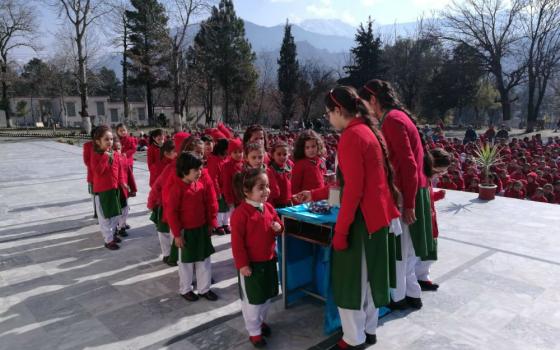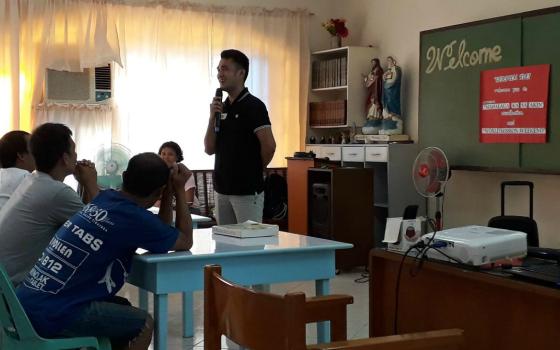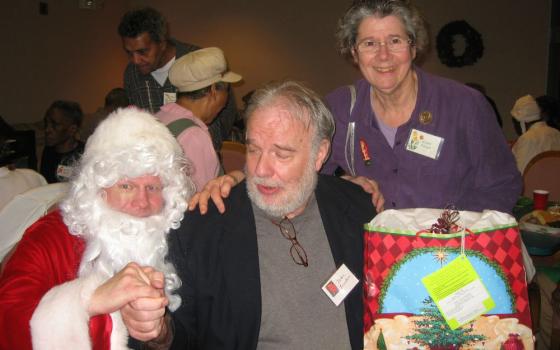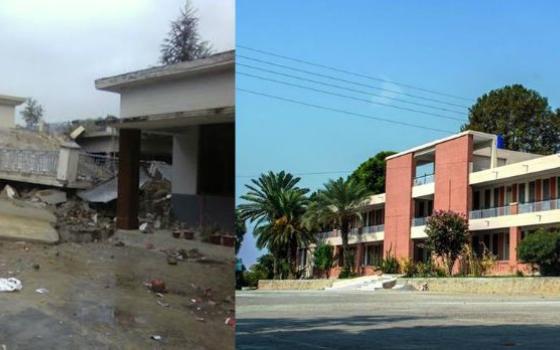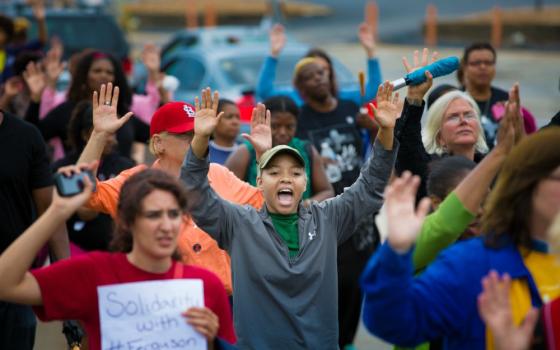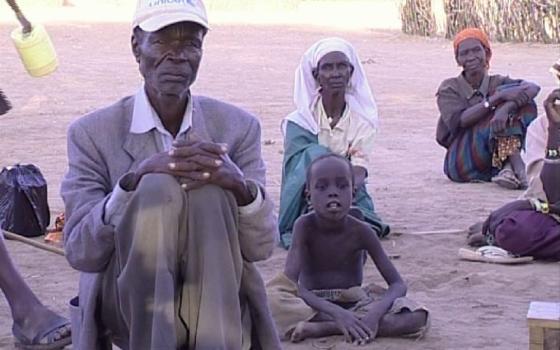Through education, forgiveness, self-knowledge, power of witness and service, sisters and their congregation are making a difference in the face of racism, religious zealotry, gun violence, tribalism and other forms of violence. This month, they wrote in response to the following question:
Has your community been impacted by guns, crime, war or other forms of violence? How did your community respond?
______

Adriana Haro Betancourt belongs to the Verbum Dei Missionary Fraternity. She is from Mexico but currently works in youth ministry in the Philippines, where she heads her congregation's national communications team and produces a weekly online radio program for youth evangelization. She made final vows in 2014.
Missionary life is a call to journey with God and with the people. God invites us to share their joys and sorrows in a journey in which we are little by little made one with them. In my experience, this happens not only with the people I serve in my apostolate, but particularly through the sorrows of my own Filipino sisters in the community.
In the past four years, the Philippines has experienced an increase in violence, with thousands of people of all ages shot in open daylight or found dead overnight, frequently related to the supposed efforts to eliminate illegal drug trafficking.
In 2016, these cases started to make headlines every day, and as the death toll increased, so did my fear and feelings of insecurity in Manila. But it was not until a close relative of one of our sisters was found killed that my community and I really entered into the tragedy that so many Filipino families are living. The victims, regardless of whether they were guilty, were beloved spouses, parents, brothers or children. Some were totally innocent, and many of them were honestly trying to reform their lives — as was the case of the cousin of our sister — but were violently denied a second chance.
Feelings of pain and powerlessness, fruits of the rotten trees of injustice and corruption, were transformed by the Lord into an opportunity for us to open our eyes and to see how we could respond as community. We took the option of offering our charism to support the efforts of the church and other organizations for the rehabilitation of drug users. We believe our contribution, countering the reality of violence that the Philippines is experiencing, is to offer the transforming power of the Word of God to those who are seeking a way out of their situation.
In partnership with other congregations and parishes, nongovernmental organizations and government programs, we have offered recollection experiences and continue to conduct regular values formation for people undergoing rehabilitation. Together with us, the lay members of our apostolic movement, the Verbum Dei Missionary Family, are on the front line of our community's efforts to "conquer evil with good" (Romans 12:21).

Karlyn Cauley belongs to the Sisters of the Divine Savior (Salvatorians) in Milwaukee. A studio artist, she ministered in art education and with sisters in temporary vows in her congregation's formation program for many years. Presently, she does ecumenical work in the adult spirituality of women.
I live in a tumultuous neighborhood in the central urban area of Milwaukee. My community, the Sisters of the Divine Savior, built 60 apartments 25 years ago to provide living space for African-Americans, who moved into this safe and affordable housing. Now we have seen the deteriorating area become the target of gunfire, drug houses and crime.
I am often asked, "Aren't you afraid to live there?" Yes, it is worrisome, but I am concerned for the residents and their families in the neighborhood. I could live with other community members in another area of the city, but I want even more to be a "true sister" to my resident neighbors and stay as a witness to this growing poverty and simplicity.
Our sisters bless Hadley Terrace, where I live, because we believe where one of us works and lives, so too do all of us. For Advent, I wrote about Gabriel, who said to Mary, "Fear not!" I imagined this formidable angel standing on the streets where I live and what would happen: The cars dealing drugs at midnight would scatter; children awakened by gunfire would watch from their windows; the guns would be dropped as felons fled the scene! Then all of us, residents, neighbors and sisters, would yell, "Hooray, Gabriel!"
I remember now that Gabriel has incredible power and guardianship walking among us, and I believe the life I live is what God wants for all the residents: grace, strength and peace in their lives.

Mary Hanrahan is a Sister of the Presentation of the Blessed Virgin Mary who has ministered in teaching and administration in inner-city Dublin with disadvantaged teenage girls. She served one term on the provincial leadership team and two on the congregational level. She is currently employed as chaplain in an all-male prison for men convicted of violent crimes.
Our founder, Nano Nagle, said, "If I could be of service in saving souls in any part of the globe, I would gladly do all in my power."
In Nano's time (she began our congregation in 1775), "saving souls" was often equated with education, both spiritual and academic. Today, almost 250 years later, our sisters across the five continents are continuing her dream, often in very difficult and dangerous circumstances.
One such place where Nano's lantern of education continues to shine brightly is in the beautiful Swat valley in northern Pakistan.
Known as the "Switzerland of the East," it is nestled in the foothills of the Hindu Kush mountain range and irrigated by the Swat River. It is one of the most beautiful and fertile valleys of northern Pakistan.
The first Presentation Sisters arrived in Swat in 1965, opening a coeducational school for predominantly Muslim and a few Christian children. In 2000, it became an all-girls' school and was well known for quality education. Our sisters grew to love the people of this beautiful valley and were highly regarded throughout the region.
Because of diminishing numbers of our sisters, we sadly turned the school over to the Carmelite Sisters in 2006.
The situation in Swat soon became very dangerous, as the ruling Taliban were vehemently opposed to the education of girls and systematically attacked girls' schools in different parts of the district. In 2008, the sisters (in consultation with our congregation) closed the school for the safety of the children and themselves. That October, our lovely school was razed by a Taliban bomb, and anything not destroyed by the blast was looted by the local people. This was one of 400 schools destroyed during the Taliban regime.
At the persistent request of the parents and with the promise of protection by the military, the Presentation Sisters moved back to the Swat valley to reopen the school in 2012. The situation had improved by then but was still not totally safe.
Today, there are 952 students in our school: 923 Muslims, 27 Christians and two Sikhs. The education of girls and young women between the ages of 4 and 17 is ensured, and a culture where diversity is respected and celebrated is dominant in the school community.
Thanks to Sr. Riffat Sadiq for her help in compiling this piece.

Lydia Collado is a Religious of the Sacred Heart sister who ministers in Northern Samar, Philippines. She is the program director and head of the Sacred Heart Institute for Transformative Education Foundation, which does campus ministry, pastoral ministry, operates a nursery, and manages Sophie's Farm, an organic demonstration farm.
Our Filipino government initiated a drug war that has caused violence of all kinds, drug-related or not.
We are shaken by this violence throughout our country, in small and big cities, urban and rural, especially among poor people.
Violence, war and crime create more poverty, which breeds more violence and illegal activities, compounded by misuse of power, lack of education and participation of those who could help, and fear and ignorance of those who do not know how to help. It is complicated, but some initiatives and responses by concerned citizens are possible.
Our congregation, the Religious of the Sacred Heart, have agreed on some responses: praying together, joining in advocacy and rallies against crimes and injustice, organizing formation and education programs to equip others to participate in the process.
Our ministry, the Sacred Heart Institute for Transformative Education Foundation (SHIFT), offered a three-year program, "Peace and Political Education (P-POL)," starting in 2016. It was a four-day seminar held in Northern Samar, one of the poorest provinces in the Philippines, where encounters between the military and rebel groups have resulted in the death of innocent civilians.
Sixty participants from government, military, law enforcement, churches, education and civil society attended the participative, reflective and prayerful program on how to conduct "Political and Peace Education" in their respective communities, using formation modules created by SHIFT and lay volunteers. At the end of the series, there was much hope that anticorruption measures could reduce poverty, the root cause of many conflicts, and the ignorance that says it is all right to kill.
We also used church social encyclicals, especially those on respect for human life, and lessons on active nonviolence to engage people in community processes to educate and protect their members. The formation series ended with deeper awareness that collective participation and action can be successful in stopping crimes and violence.
As we prayed and reflected, we realized we also have to deal with our own violence and the peace process will have to begin with ourselves. Peace, good citizenship, active nonviolence, nourishing and defending life must begin with me.

Amy Hereford is a Sister of St. Joseph of Carondelet from St. Louis. Her background includes teaching, communication, management and administration. As an author, theologian, and civil and canon lawyer, she consults with religious communities and charitable organizations around the world, addressing technical concerns of religious institutes and exploring the evolving nature of religious life.
I grew up about 5 miles from Ferguson, Missouri, which became infamous worldwide as the site of the 2014 police shooting of Michael Brown, an unarmed black teen. Already marred by a long history of racial tensions, St. Louis erupted in protests in which people expressed their anger and frustration over yet another police shooting of yet another unarmed African-American.
And the Black Lives Matter movement was born, building on years of community organizing.
I have lived in St. Louis much of my life, and many sisters in my community have served in the black community and in other communities of color. Yet I have to acknowledge that I have been too complicit for too long in the original sin of our country, the sin of racism. It's in the air we breathe and in the water we drink. It's as natural to us as our own skin, the white skin that gives us the privilege of thinking of race only when and where we choose. And it's time to change.
I continue to join protests organized by Black Lives Matter. I continue to support immigrant communities that are increasingly vulnerable in today's political climate. I continue to read and pray and reflect on my own complicity in systemic racism. I continue to try to peel back the layers of racism in my own heart, in my own circles, among my sisters, and in our ministries. It is a long, long road.
And it is a road that has already been trodden for centuries by people of color as they struggle with courage and dignity against incredible obstacles thrown in their path by racism in all its forms. In all this work, I call on my heritage as a Sister of St. Joseph, called to "gentleness, peace and joy."

Adelaide Ndilu is a Sister of the Immaculate Heart of Mary. After a varied career in teaching and administration and as well as working as secretary in a nursing school and for an archbishop, she studied mass communications. For several years, she has been producing stories and interviews on church and justice topics for Radio Waumini, a Catholic radio station in Nairobi, Kenya.
I had heard of wars between countries and clashes of ethnic groups, but I never thought it would one day be very close to me.
It was during the 2007-08 post-election violence in Kenya that I saw hostility and hatred written on the faces of Kenyans. Neighbors who had lived together in peace and harmony for years turned against one another and suddenly became sworn enemies.
This began when the presidential results were announced in December 2007. Members of the opposition were sure their preferred candidate, Raila Odinga, was winning. Mwai Kibaki, who was mainly supported by people from central Kenya, was announced as the winner. Members of the opposition, mainly comprised of the Luo and Kalenjin ethic groups, claimed the ruling party had rigged the elections.
Eldoret County with its Kalenjin indigenes was worst hit, and this is where three of our sisters lived in the rural shanty town of Kapkoi. We watched helplessly and fearfully as large plantations of maize went up in flames and houses of nonindigenous people were set ablaze by young men of the Kalenjin community.
On their way to destroy people's property, they would walk into our dispensary and demand free medication, saying this was their hospital and that the sisters were not indigenous people. This became a routine as the clashes got worse each day.
What is most astonishing is that as they torched the houses of nonindigenes, they never laid a hand on the sisters. They said it was because the sisters treated them, and their mothers gave birth to them in the same health facility.
The sister in charge of the dispensary took the opportunity to speak words of forgiveness to them. And with time, their hostility ceased, and they became friends of the sisters. However, the superior asked the sisters to leave.
They left in mid-January 2008, under tight security by the police. The tribal clashes escalated until mid-February, when dignitaries including the former United Nations secretary-general, Kofi Annan, arrived in the country to help negotiate for peace. A deal was signed, with Mwai Kibaki remaining the president and Raila Odinga becoming the prime minister.
At this, peace was restored, and the majority of Kenyans who had fled the clashes returned to their places of work. The sisters too returned to Kapko to live together again in unity and peace, as children of God — all resolving, "Never again."
